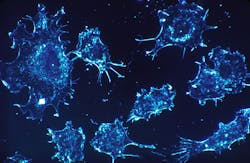If cancer is a series of puzzles, a new study pieces together how several of those puzzles connect to form a bigger picture, according to new research from the University of Michigan (U-M). One major piece is the immune system and the question of why certain immune cells stop doing their job. Another piece involves how histones are altered within immune cells. A third piece is how a cell’s metabolism processes amino acids.
The study found a connection between these three separate puzzles that suggests targeting the amino acid methionine transporter in tumor cells could make immunotherapy effective against more cancers. It starts with T cells, the soldiers of the immune system. Cancer can turn these cells abnormal, preventing T cells from mounting an attack against it. The question is: what causes this?
Researchers looked at the tumor microenvironment, specifically how tumors metabolize amino acids. They found an amino acid called methionine had the most impact on T cell survival and function. T cells with low levels of methionine became abnormal. Low methionine in the T cells also altered histone patterns that caused T cells to be impaired. Introducing tumor cells to the picture creates a fight between the tumor cells and the T cells for methionine. Over and over, the tumor cells win, taking the methionine from the T cells and rendering them ineffective.
Previous research has considered a systemic approach to starve tumor cells of methionine, with the idea that the tumor cells are addicted to it. But this study shows why that approach may be a double-edged sword. In fact, the study found that supplementing methionine actually restored T cell function. High enough levels of methionine meant there was enough for both tumor cells and T cells.
One key is that tumor cells have more of the transporters that deliver methionine. The researchers found that impairing those transporters resulted in healthier T cells as the T cells could compete for methionine.

